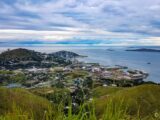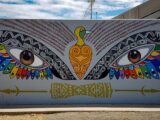I’ve never seen my parents more shocked than when I’ve told them that I’d be moving to Papua New Guinea.
(Btw, nobody here calls it PAPUA-NEW-GUINEA. It’s simply PNG for short. And now that you know that, you’re part of the in-crowd.)
While my parents were slowly getting used to the thought that I’d soon be living on the other side of the planet, I was booking flights, quitting my job, and slowly packing up my things in my Amsterdam apartment.
That was in 2016.
I had finished my MBA program at the Rotterdam School of Management the year before and was working as an HR Project Manager in one of the Netherlands’ largest banks. Although I got into my dream position, I was quickly disillusioned about the impact I could make.
That’s why, when my then-boyfriend-now-husband said one day “Hey, I’ve got a job in Papua New Guinea. Wanna come?” – I said “Yeah, sure!”
And that’s how our adventure in the South Pacific started.
Fun facts about Papua New Guinea
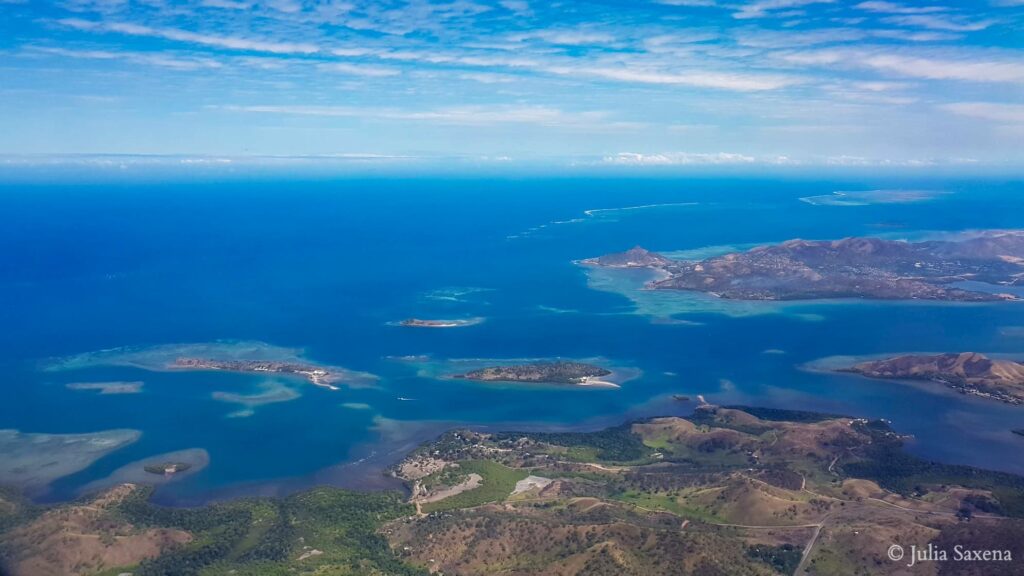
What do you know about PNG? I was roughly aware that it’s located north of Australia and close to the equator before moving here. Let me get you up to speed with some quick facts:
- Third-largest island country in the world
- Capital city is Port Moresby
- Independent from Australia since 1975
- Part of the Commonwealth
- Population of 8.6 million people
- Classified as a developing economy
- National animal is the bird of paradise
Besides, PNG is best known for languages …
It’s the most linguistically diverse place in the world
Someone has counted 851 languages in PNG. Besides English, Tok Pisin is the language, which is most widely spoken. It has influences from English and German. The German influence comes from the fact that the northern half of the country was a German colony from 1884 to 1914.
I have to confess I never really attempted to learn Tok Pisin, besides picking up some odd words here and there. Other expats warned me that it might mess up my English pronunciation and spelling. And looking at the words below, you will understand why.
- Welcome – Welkam
- Thank you – Tenkyu
- Sorry – Mi sori
- Please – Plis
- I don’t know – Mi no save
- Goodbye – Gutbai
80% of Papua New Guineans live in rural areas
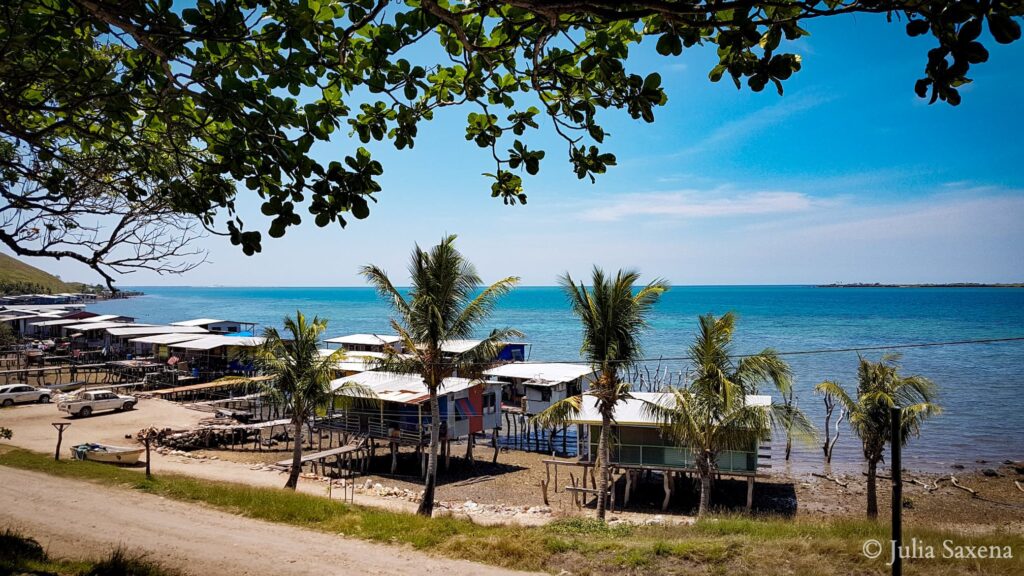
While in many countries life concentrates around a few big cities, in PNG most inhabitants live in small villages scattered around the country and its many islands.
And that mostly means no direct access to electricity, running water, and other modern facilities. It’s a simple life in tune with nature – where people still grow their own vegetables and go fishing with small wooden canoes.
What it’s like to live here
“It’s different” is my first answer when someone asked me how it is living in PNG. I mean, sure, we live in a normal apartment. But many amenities that people in developed countries take for granted don’t exist here. There’s no Starbucks, McDonald’s, H&M, Zara, or any of your favorite shops. Port Moresby has the only two cinema halls in the entire country. And say goodbye to unlimited data.
To my surprise, I didn’t really miss any of these things – except the unlimited data (you got me there). I quickly realized that the majority of products, services, perks, you name it, that we think we can’t live without are completely superfluous.
And I started to appreciate the truly beautiful things around me…
The great stuff about PNG
The best thing for me is that I get to look at the ocean every day. I observe how its color changes, depending on what the sky is like that day. I can see the waves break at the coral reef in the distance and the fishermen looking for crabs when the tide is low.
This country still has pristine, truly untouched nature, which is also incredibly diverse. The central part of the country is called The Highlands. That’s where a thick rainforest meets mountains reaching above 4,000 meters (13,000 feet).
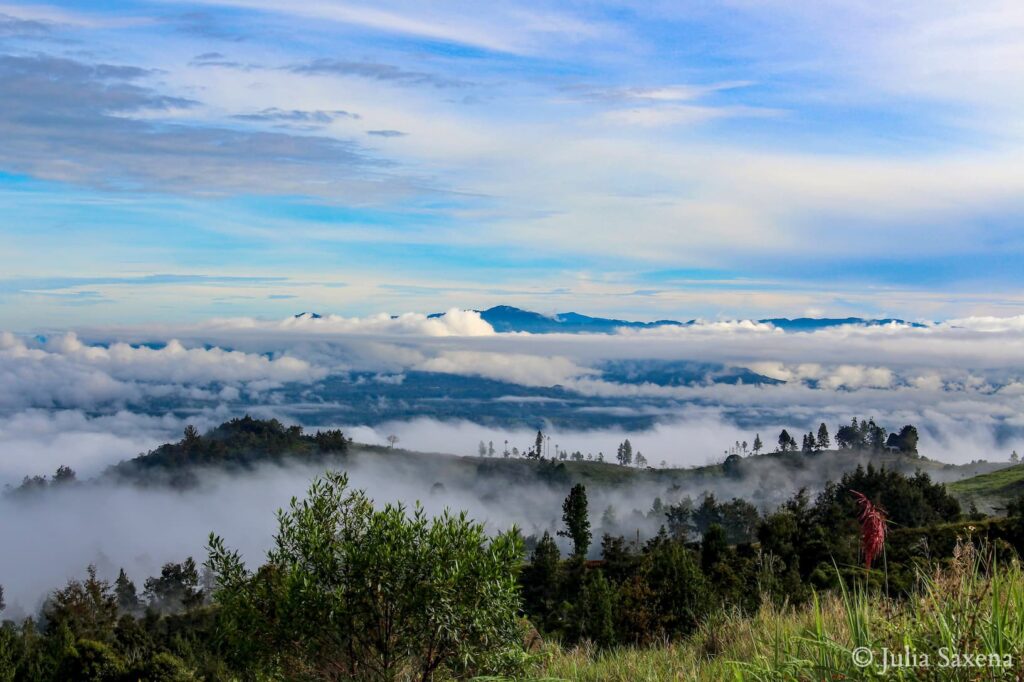
PNG’s 600 islands, on the other hand, are surrounded by crystal clear water. You’ll find superb snorkeling and diving spots here. Jumping into the warm water feels like going for a swim in an aquarium.
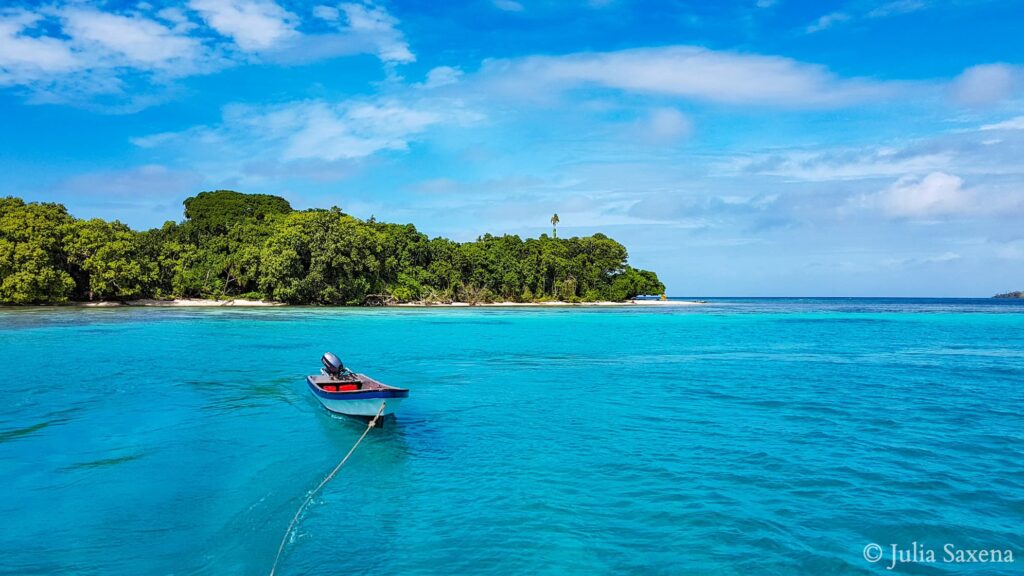
People are generally very friendly, warm, and welcoming. Don’t be surprised when a person you’ve never met enthusiastically waves and smiles at you from the neighboring car when you’re stopping at a red light. And especially the kids can’t hide their excitement when they see foreigners around. This never fails to warm my heart.
PNG is home to countless cultural groups who express themselves with a plethora of art forms – such as singing, masks, and costumes. Several famous mask festivals celebrate this diversity every year. I haven’t had the chance to attend one, unfortunately, but it’s still on the list.
The not-so-great stuff
While most parts of the country are fairly peaceful, the capital Port Moresby can be dangerous. Carjackings do happen. And it doesn’t feel safe to walk outside on the street. Our apartment building is hidden behind a large fence and gate. Restaurants, malls, and businesses in general always have security guards around. This is something I had to get used to.
What I ended up missing the most, besides going for a walk outside, are my friends and family. Turns out, you still can’t beam people across the planet. Is someone working on this?
4 peculiar things about Papua New Guinea
This is the stuff that always gets a “No way!” reaction when I mention it.
Cost of living is higher than you might expect
Many people assume that just because PNG is a developing country, the average cost of living must be low. That’s not true at all.
I regularly see expressions of disbelief when I say that the furnished, 2-bedroom apartment we live in costs USD 4,000 per month. This is paid for by my husband’s employer, as is common for all expats. I should add that our apartment is nothing special and actually in the lower range for expat housing.
These out-of-proportion prices are the result of an LNG (liquid natural gas) boom that brought an influx of expats and money into the country. And the real estate market simply couldn’t keep up with the skyrocketing demand.
When it comes to groceries and eating out, prices are similar to what you pay in Europe, the US, or Australia. Most products are imported from Asia or Australia, which drives up the costs.
Why smoke when you can chew
One of the most peculiar things I found when moving to PNG is related to a fruit, officially called the areca nut. It’s most commonly known as betel nut, though.
This innocent green nut, a bit bigger than a walnut, is essentially a drug. It has a psychoactive ingredient that is similar to nicotine and hence highly addictive. The locals buy betel nut and lime from small street vendors (even though it’s officially banned), peel it and chew the inner core together with the lime.
The chewing produces a bright red liquid that stains the teeth and the whole mouth. This residue is then spat out. Imagine it: thick, blood-colored spots everywhere on the streets.
People also like to chew betel nut while driving and simply spit the red liquid out of the window. If you happen to pass by at this moment, you can end up with a nasty red stain on your car. Yuck!
Betel nut is, unfortunately, not only addictive but also very unhealthy. It destroys the teeth and is linked to cancer growth.
Cannibals still exist
PNG is one of the places where cannibalism was practiced until quite recently – with the last case reported in 2012.
On a weekend trip to the south of the country, my husband and I took a trip to a skull cave. Here, three hunters of a long-gone tribe were competing for the highest number of kills (as in people). And judging by the height of their skull mountains, they were pretty successful.
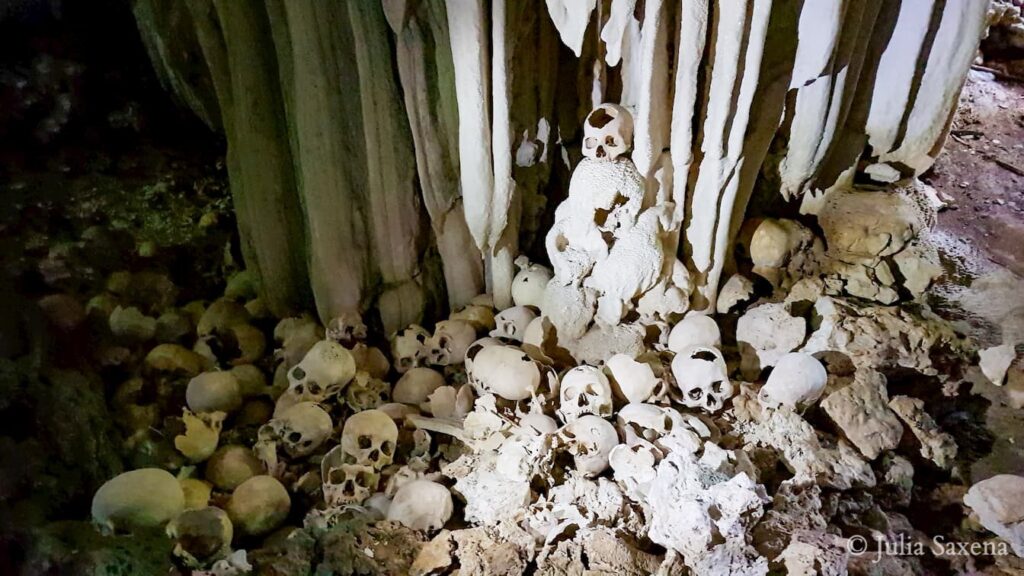
We’ve also heard the story of an Australian gentleman who landed his plane on a small island in the area decades ago. The local tribe was intrigued by the white skin of the man they had never seen before. He was soon running for his life and managed just to escape, leaving behind only one of his boots. The locals were convinced that the man must have lost his foot and were trying to cook and eat it. To their surprise, the “foot” turned out very rubbery and inedible. So, they came to the conclusion that white people aren’t tasty.
Who was watching the tribe do that and lived to tell this story – I have no idea.
Beliefs in sorcery and witchcraft
Many Papua New Guineans still hold on to ancient tribal belief systems. Many believe that a sudden illness or untimely death is caused not by something, such as an accident or disease, but by someone. In search of a scapegoat, individuals are accused of being evil practitioners of black magic, locally called sanguma. Women are the main victims of these accusations, which often end tragically in torture and death.
Hardly anybody is aware of these modern-day witch hunts as most cases happen in remote parts of the country and often remain unreported. The issue has gotten some international press with articles in Time Magazine and Post Magazine, though.
What else?
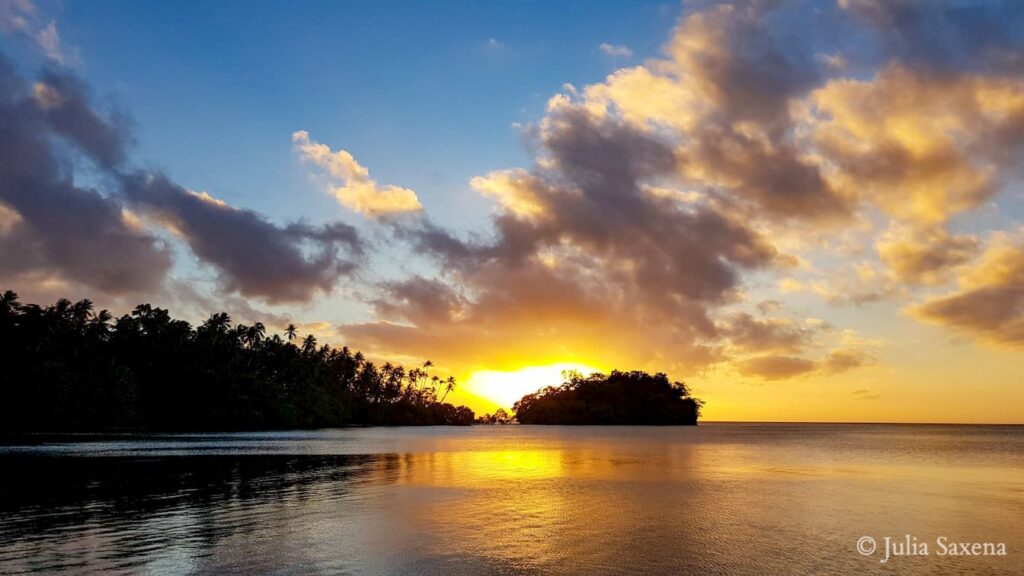
PNG is truly special, and I find it very hard to describe how it’s like here. This article was just a glimpse into a diverse culture with so many facets. There is so much more ground to cover. And it won’t be the last time I’ve written about it. If you’d like to know more and are thinking of planning a trip here, just hit me up.


